General Health Tips & News
Probiotics
By A.A. (staff writer) , published on October 07, 2020

Medicine Telehealth Health probiotics benefits of probiotics gut bacteria friendly bacteria
Probiotics are gut-friendly bacteria or yeast. It is a misconception that they are harmful and cause diseases. The human body contains both good and bad bacteria. As probiotics keep your digestive system and gut-healthy that's why they are called helpful or good bacteria.
Probiotics are present in foods like yogurt and various supplements. In digestive problems, many doctors suggest probiotics.
Your body and good bacteria create your microbiome. There are trillions of microbes present in your body. Microbes of the body keep your body healthy by working together. These microbes include
- Bacteria
- Protozoa
- Fungi
- Viruses
The microbiome of everyone is different. There are certain characteristics of a microbe to be called probiotics, these include
- Must be isolated from a human
- After ingestion, they must survive in the intestine
- Proved to be beneficial for you
- Safe consumption1
How do probiotics work?
Studies are underway to find out the working of probiotics. The following are the ways that keep your gut healthy by probiotics.
The main function of good bacteria or probiotics is to maintain a healthy balance in your body. Bad bacteria enter your body when you are sick and tend to multiply. They disturb the balance of your body. To restore the balance of the body, good bacteria’s have to fight against bad bacteria to restore the balance of the body, so that you feel good. Good bacteria control the inflammation and support your immune system to keep you healthy.
Good bacteria’s can also perform the following functions
- The imbalance in the number of good bacteria in the body disturbs your gut. This mostly happens when you take antibiotics. Probiotics help to replace the effects of antibiotics and increase good bacteria in the gut.
- Probiotics keep the balance of good and bad bacteria in the body which keeps your body healthy2.
- Assist in the food digestion
- Control the growth of bad bacteria and improve your health
- Create vitamins
- Breakdown and absorb medications3
Types of Probiotics
There are different bacteria included in probiotics. They have different benefits. However, they come from two groups, Lactobacillus and Bifidobacterium.
Bifidobacterium:
It is present in some dairy products. They can manage or ease the symptoms of different conditions including irritable bowel syndrome.
Lactobacillus:
They are present in fermented foods and yogurt. They are the most commonly used probiotics. Different strains are used to treat diarrhea. They are also used for lactose intolerance (a milk sugar that cannot be digested by many people).
Saccharomyces boulardii:
Probiotics also contain yeast. It fights different digestive diseases including diarrhea4.
Are prebiotics the same as probiotics?
No, probiotics and prebiotics are not the same. Prebiotics are food components that are non-digestible and selectively support the growth of desirable microorganisms. Synbiotics are products that contain prebiotics and probiotics.
Popularity of probiotics
Probiotics and prebiotics are the 3rd most commonly used dietary supplement other than vitamins and minerals. Between 2007 and 2012 the use of probiotics has increased5.
Benefits of taking probiotics
All probiotics are not the same. There are different effects of different strains of the bacteria. For example, some strains are effective against cavity-causing organisms in the mouth and some are good for the gut.
The probiotics are beneficial in the prevention and treatment of many diseases including
- Diarrhea
- Irritable bowel syndrome
- Ulcerative colitis
- Vaginal infections
- Ulcers due to H. pylori
- Eczema in children
- Pouchitis
- Recurrence of bladder cancer
- Crohn's disease
- Urinary tract infections
- Digestive tract infection caused by Clostridium difficile6
Safety of probiotics
At recommended doses, probiotic supplements and foods are proved to be safe in the general public7.
Probiotics from foods
Food can be a good source of beneficial microbes. You can improve the health of the microbiome by eating probiotic foods. You can add probiotic foods in your diet at any point in the day. They are common foods you consume regularly. The following are the commonly used probiotic foods.
- Yogurt
- Sourdough bread
- Cottage cheese
- Kombucha
- Fermented pickles
- Fermented sauerkraut
- Kimchi
- Buttermilk
- Tempeh
- Miso soup
Make sure that every time you sit down to eat, you're still creating a balanced and healthy meal. Although adding probiotic-rich foods to your diet will not hurt you, balance is still important. Adding too much of a single food prevents your body from reaping the benefits of other food groups8.
Probiotics Side Effects
The mild digestive side effects include bloating or gas. In some people, more serious side effects can also be seen. It is thought that probiotics may cause infections that require antibiotics treatment. Probiotics also lead to unhealthy metabolic activities9.
References
- Probiotics. [internet]. [cited 2020 August 31]; Available from https://my.clevelandclinic.org/health/articles/14598-probiotics
- What are Probiotics? [internet]. [cited 2020 August 31]; Available from https://www.webmd.com/digestive-disorders/what-are-probiotics#1
- Probiotics. [internet]. [cited 2020 August 31]; Available from https://my.clevelandclinic.org/health/articles/14598-probiotics
- What are Probiotics? [internet]. [cited 2020 August 31]; Available from https://www.webmd.com/digestive-disorders/what-are-probiotics#1
- Probiotics: What You Need to Know. [internet]. [cited 2020 August 31]; Available from https://www.nccih.nih.gov/health/probiotics-what-you-need-to-know
- Health benefits of taking probiotics? [internet]. [cited 2020 August 31]; Available from https://www.health.harvard.edu/vitamins-and-supplements/health-benefits-of-taking-probiotics
- What are probiotic supplements – and are they necessary? [internet]. [cited 2020 August 31]; Available from https://www1.racgp.org.au/newsgp/clinical/what-are-probiotic-supplements-%E2%80%93-and-are-they-nece
- Probiotics. [internet]. [cited 2020 August 31]; Available from https://my.clevelandclinic.org/health/articles/14598-probiotics
- Probiotics. [internet]. [cited 2020 August 31]; Available from https://www.medicinenet.com/probiotics/article.htm
Find articles related to: Medicine Telehealth Health probiotics benefits of probiotics gut bacteria friendly bacteria
More articles about General Health Tips & News
Back to the Health Tips Index




